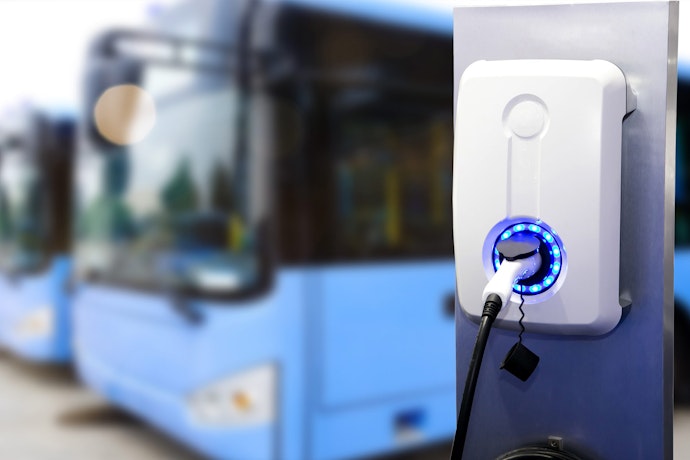Electric Vehicle Fleet Management Features by Verizon Connect
Electric Commercial Vehicles and Fleet Management with Reveal
Read more
Electric vehicles (EV) are the future of transportation. They’re a key piece of the puzzle when it comes to improving environmental sustainability and we’re therefore seeing the shift towards EVs. This applies to commercial vehicles, such as fleets of LCVs, just as much as passenger vehicles.
A fleet management solution can help manage electric vehicle fleets smarter and more efficiently for the sake of the environment but also for the sake of your budget. Beyond utilising electric vehicles for a sustainable future, EVs can also help you simplify compliance with emissions regulations and reduce your operational costs—the best of both worlds. So, it’s high time we took further steps towards electrification.
Let’s dive into the ins and outs of future electric vehicle fleets and why it’s worth your while to electrify your fleet.
Currently, electric vehicles still represent only a small proportion of light commercial vehicles (LCVs). As recently as 2018, only 0.3% of new vans were electric, while 96.2% of vans on the road were diesel powered. However, this landscape is poised to change dramatically.
The upward trend in EV sales figures from the past few years demonstrates how electric vehicles are the future of transportation in Europe. From 2018 to 2019, there was a whopping 44% increase in battery electric vehicle (BEV) and plug-in hybrid electric vehicle (PHEV) sales in Europe. This followed a 34% increase in overall EV sales across Europe between 2017 and 2018 – a period in which global EV sales totalled approximately 2.1 million, an increase of 64%. In short, the future of electric vehicles is already beginning.
There are various reasons why the future of electric vehicles looks bright—not least the benefits they can bring to your fleet and business:
Environmental: Fleet decarbonisation shows a commitment to sustainable practises and dedication to action on climate change. It’s also a great way to meet sustainability commitments such as the 2015 Paris Agreement on Climate Change.
Economical: Total cost of ownership calculations improve the business case for new electric cars due to their lower operating costs.
Social and health: Electric vehicles can lead to improved driver experiences and reduced driver fatigue as a result of less noise, fumes and vibrations.
Reputational: Fleet electrification demonstrates an ethical and forward-thinking organisation that is on top of emerging technologies.
In addition to the advantages EVs bring to fleet managers and automakers, the measures that governments and the EU are implementing to encourage electrification further indicate that they’re the future.
EU legislation has set mandatory emissions and fossil fuel reduction targets for new cars since 2009 and since 2011 for new vans. The most recent regulation, (EU) 2019/631, sets CO2 emission targets for newly registered passenger cars and vans. For vans and LCVs, the target reduction is 15% from 2025 on and 37.5% from 2030 on.
The UK government is also committing to long-term targets on emissions reduction, paving the way for the increased adoption of electric vehicles. These include:
These governmental commitments across Europe underline the importance of electric vehicles to a sustainable future. Not only does adopting electric vehicles bring many benefits for fleet managers, pivoting to an electric vehicle fleet may be necessary sooner rather than later due to the government’s targets.
In addition, there are several tax benefits and government grants to incentivise the shift to electric vehicles. For example, zero-emission vehicles valued less than £40,000 are exempt from Vehicle Excise Duty (VED). This applies to both EV acquisition and ownership. In addition, the government offers plug-in grants to vehicle dealerships and manufacturers, up to the value of £3,000. This means that you automatically get a discount on the price of a new low-emission vehicle that’s eligible for the grant. (1)
Given that electric vehicles are the future of transportation, we’re committed to supporting you in managing electric vehicle fleets . Our existing fleet management solutions are already powerful tools at your disposal. Now, we’re launching various new features throughout 2023 to better support electric vehicle tracking and management in Reveal. These features are specially designed to help ease you into the adoption of electric vehicles in your fleet, meet your sustainability goals and reduce costs.
The key features include:
Learn more about how Verizon Connect solutions can bring every function of your business together with our free eBook.
Tags: All



Find out how our platform gives you the visibility you need to get more done.
Electric Commercial Vehicles and Fleet Management with Reveal
Read moreElectric vehicles are the future of transportation and offer many benefits. Learn how Verizon Connect helps improve electric...
Read moreWhat constitutes green transport and what is its status in the EU? Find out about the benefits of a green fleet and what...
Read moreUntil very recently, electric vehicles (EVs) were seen as a fringe alternative to traditional petrol and diesel-powered...
Read more